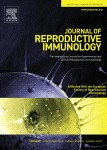Kotlabova K, Doucha J, Hromadnikova I. J Reprod Immunol. 2011 May;89(2):185–91. Epub 2011 Apr 21. IF: 2.204

Department of Obstetrics and Gynaecology
Abstract:
The goal of this study was to identify placental specific microRNAs present in maternal plasma that differentiate between women with normal pregnancies and nonpregnant individuals. The selection of appropriate pregnancy-associated microRNAs with diagnostic potential was based on the following criteria: (1) detection rate of 100% in full-term placentas, (2) detection rate of ≥ 67% in maternal plasma throughout gestation (at least four positive wells out of six tested wells) and (3) not detectable in whole peripheral blood and plasma samples of nonpregnant individuals. Initially, we tested microRNAs (miR-34c, miR-372, miR-135b and miR-518b), which had been previously identified as pregnancy-associated microRNAs. Additionally, we selected 16 other highly specific placental microRNAs (miR-512-5p, miR-515-5p, miR-224, miR-516-5p, miR-517*, miR-136, miR-518f*, miR-519a, miR-519d, miR-519e, miR-520a*, miR-520h, miR-524-5p, miR-525, miR-526a, and miR-526b) from the miRNAMap database. Seven microRNAs (miR-516-5p, miR-517*, miR-518b, miR-520a*, miR-520h, miR-525 and miR-526a) were identified as new pregnancy associated microRNAs with diagnostic potential. Their levels in maternal plasma during the 36th week of gestation corresponded to 45.0–427.0 pg of total RNA (enriched for small RNAs) per milliliter of maternal plasma.
-mk-
